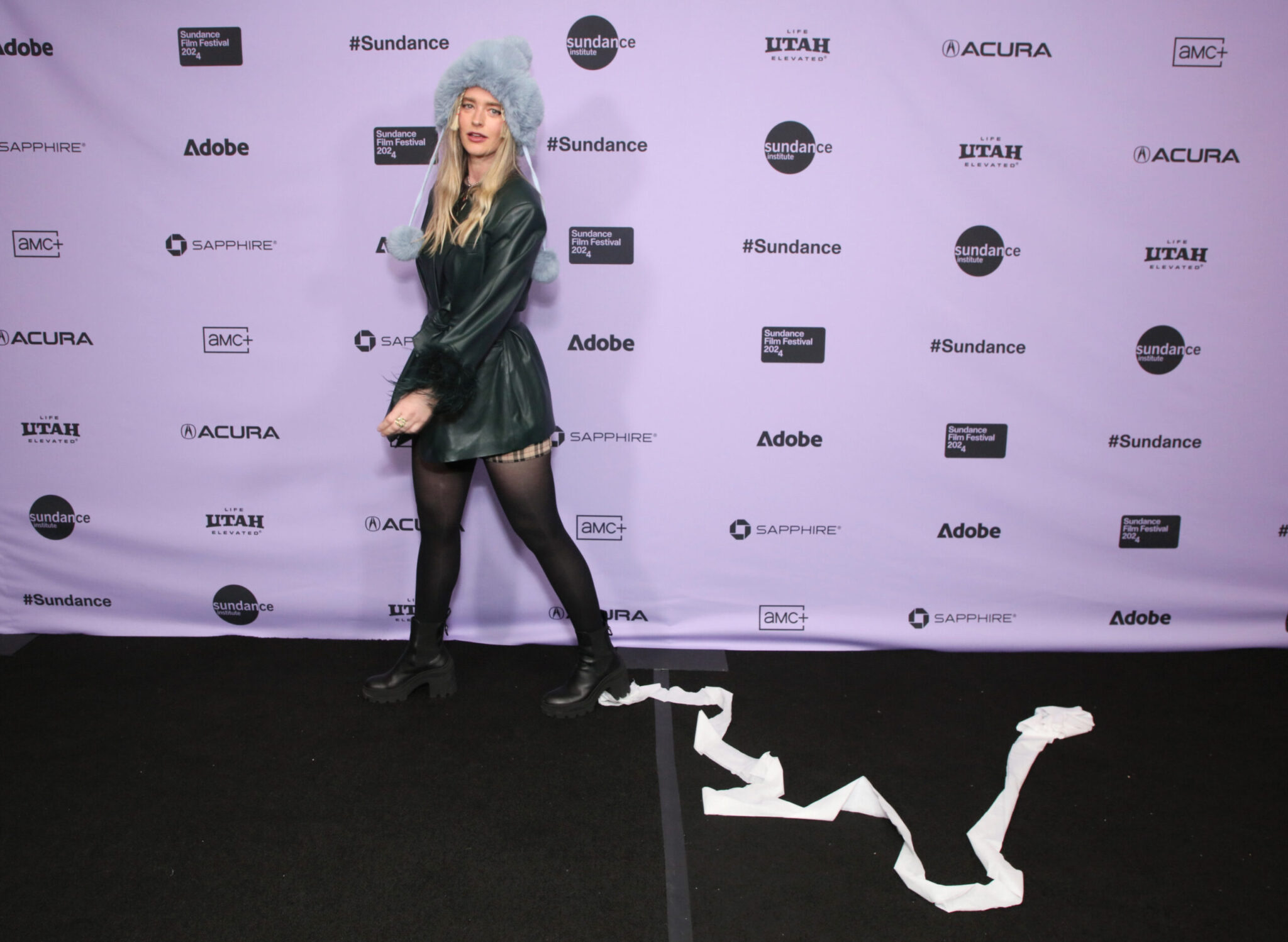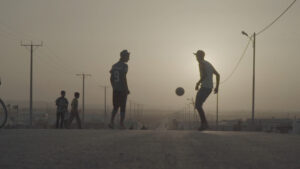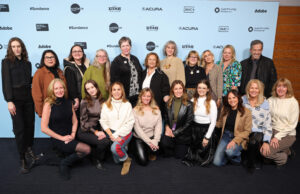PARK CITY, UTAH – JANUARY 21: Kate Jean Hollowell at Prospector Square Theatre at the 2024 Sundance Film Festival. (Photos by Robin Marshall/Shutterstock for Sundance Film Festival)
By Stephanie Ornelas
When Kate Jean Hollowell, director of the 2024 Sundance Film Festival award-winning short Say Hi After You Die, steps onstage at Prospector Square Theatre on January 21, she is accompanied by none other than a large cutout porta-potty named Ruby. It really sets the stage for the entire Q&A.
“I want to thank my amazing co-star, the porta-potty,” says Hollowell before encouraging a round of applause from the audience.
Also joining Hollowell are the rest of the directors whose projects make up Short Film Program 4: Nico Casavecchia (Border Hopper), Daniel Barosa (Boi de Conchas (The Shell Covered Ox)), Dylan Guerra (Didn’t Think I’d See You Here), Vaggelio Soumeli (Phoebe), and Kantarama Gahigiri (Terra Mater), who are all excited to talk about the inspiration behind their films. One by one, they share with audience members what made them want to dive into their projects, each with characters grounded in such peculiar and unique worlds.
Say Hi After You Die — “I started working on this script with Ruby Caster, an amazing writer. We wrote it together,” says Hollowell. “I’m always interested in death, the afterlife, what happens when we lose someone we love, and how we all have different grieving processes. We just loved the idea of a porta-potty being this weird reincarnation story. And from there, we just built the whole thing out.”
Border Hopper — “This story happened for real. It was kind of this surreal experience that was so intense, we started taking notes,” says director Nico Casavecchia. “This was playing [out] like a thriller. It had big stakes. Is it a horror story? Is it a thriller? We didn’t know.”
His short film centers on a Latinx filmmaker who discovers a way to navigate the U.S. immigration system and get the travel permit she needs to start her dream job abroad.
“I think, in a way, we’re blessed with this idea of alchemy — turning traumatic events into art and [making] fun of ourselves. This is kind of a story of immigrant privilege. And we thought that it needed to play as a comedy as well. We didn’t want to take it too seriously, even though it was a very serious story.”
Boi de Conchas (The Shell Covered Ox) — Director Daniel Barosa had always wanted to make a film about Bertioga, a small fishing community in Brazil where his wife grew up. And that’s precisely what he did.

“I found out about this local folklore about an ox that runs off to the sea to run away from its owner, and it gets lost in the ocean. They say you can see it walking the beaches covered in white seashells at night. It was a beautiful folklore with a lot of meaning, so I mixed that with coming-of-age teen angst. It was like a love letter to the community of Bertioga.”
Didn’t Think I’d See You Here — Dylan Guerra was grieving a relationship when he began encountering feelings of depression for the first time. So, he decided to make a short film as a release.
“I had all of this grief, and I didn’t know where to put it. It felt like everybody could see it. I was from the theater world, and I had never made a film, and I wanted to convert something into this realm. I woke up one morning, and my shower was running, and nobody had turned it on. My roommate and I were really freaked by it. I’m terrified of squatters or the articles where you see people in the walls. So I was worried it was that or a ghost. Then, this movie started to reveal itself. And suddenly, I had a way to explore [my] feelings.”
Phoebe — Working as a prison volunteer for over 20 years inspired Vaggelio Soumeli to make her a short film. Phoebe is centered on a mother who embarks on a life-altering road trip with her son after she’s just been released from rehab.
“At the beginning, it was male prisons,” says Soumeli of her volunteer work. “But then I was a street worker for many years with women drug addicts with families. I think [this film] is a trip to freedom. I care a lot about the truth of these characters.”
Terra Mater — Kantarama Gahigiri has been visiting the Nairobi landfill, the focus of her short film, since 2018. Her goal is to make a feature film telling this story.
“You have to imagine this is 30 acres big, there are buildings around it, and communities are living there doing activist work of rehabilitation because there are many, many problems and illnesses caused by this trash,” explains Gahigiri.
“So I met the communities, and I knew that I wanted to shoot there. Everybody that you see on screen lives in or around the dump site. I wanted to address what we’re taking from the land and what we’re giving back because, going there, I realized that most of the trash comes from Europe. It raised a lot of questions. I wanted to address that with the community. [This film] was not made about them. It was made with them.”




